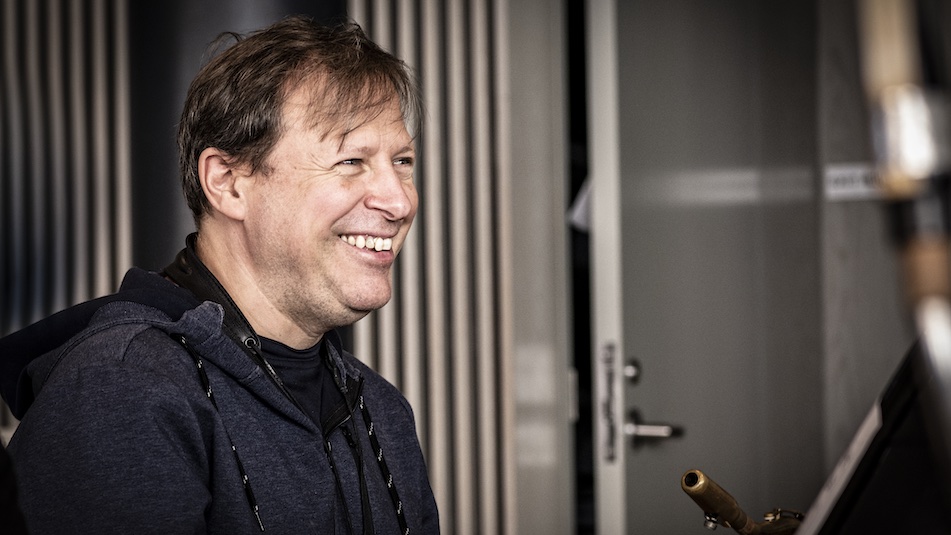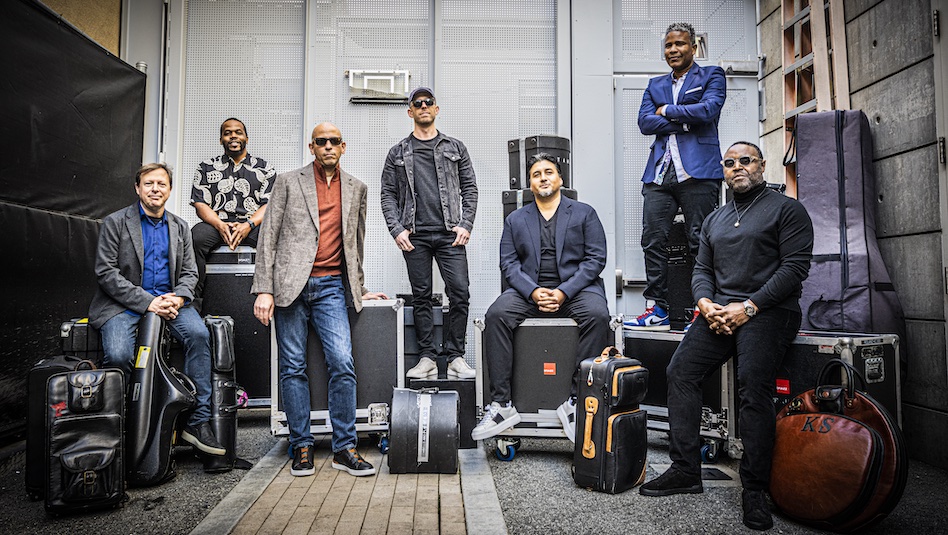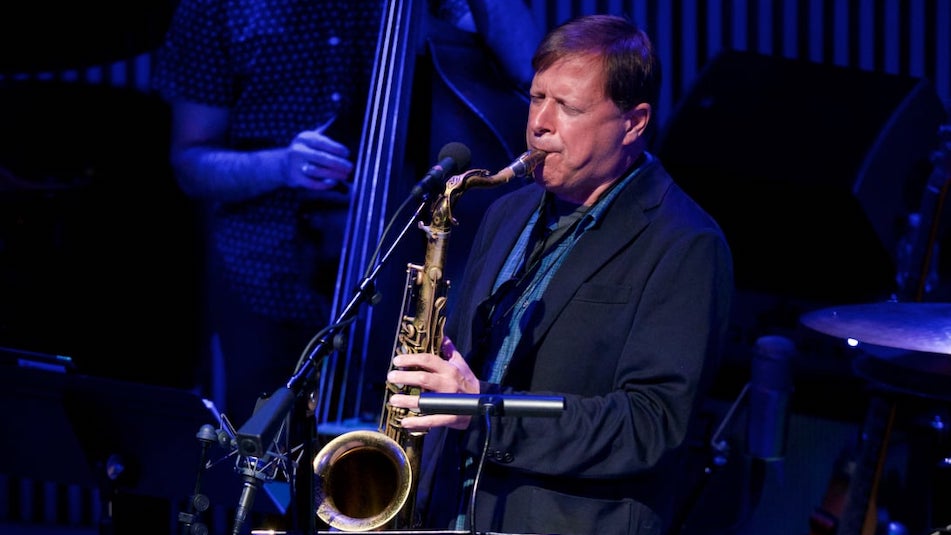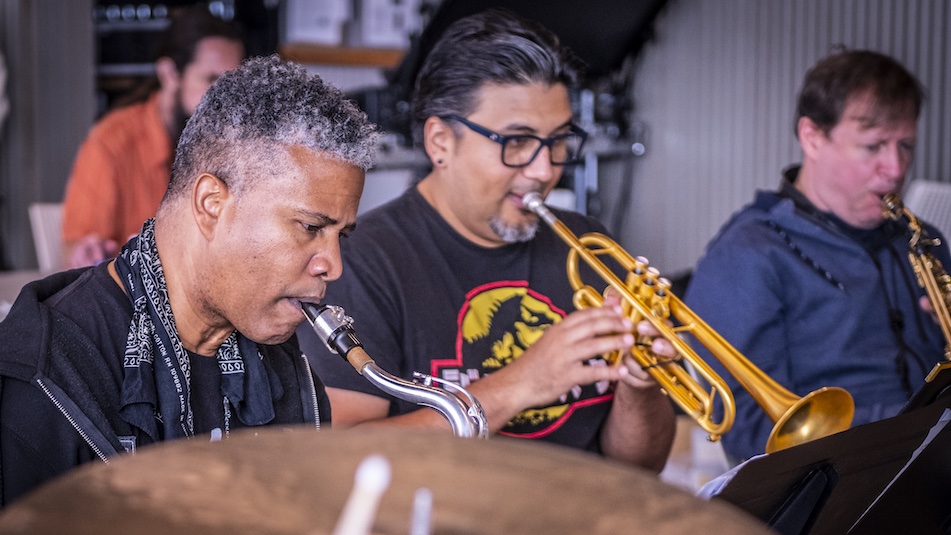Everybody Listens:
A Q&A With Chris Potter
October 18, 2022 | by Richard Scheinin

Chris Potter in rehearsal with the SFJAZZ Collective in October 2022. (photo by Don Dixon)
Having the SFJAZZ Collective currently in residence at the SFJAZZ Center and hearing their season material coming together is always fun and inspiring. To shed some light on their four nights of performances (10/27–30) as well as the inner workings of the band, SFJAZZ staff writer Richard Scheinin spoke to tenor saxophonist and Music Director Chris Potter.
Saxophonist Chris Potter is a mild-mannered man whose performances can be intimidating.
Not that he’s looking to upstage anyone. He’s not like that.
He’s known as a team player, someone who elevates any given musical situation. But he’s also someone who can take a bird’s-eye view of whatever the situation might be, size it up, and — mysteriously, even if he’s stepping in at the last minute — execute in a “how-did-he-do-that” kind of way. It’s not easy to be the soloist who comes after Potter. The late Jimmy Heath, one of jazz’s most revered saxophonists and musical thinkers, once recalled playing an outdoor gig with 15-year-old Potter. Tourists were wandering about. No one was paying attention — except when Potter took a solo, causing Heath to say to him: “Boy, you’re E.F. Hutton. When you play, everybody listens.”
Potter, now 51, is entering his second season as Music Director of the SFJAZZ Collective, which will perform a program titled “New Works and Reimagined Classics” this month (Oct. 27-30) at the SFJAZZ Center in San Francisco. The seven-member all-star band will premiere a bunch of original compositions along with some surprising arrangements of familiar tunes — including one in which Potter melds “God Bless the Child” (by Billie Holiday) with “That’s the Way of the World” (by Earth, Wind & Fire). “There’s a harmonic progression that’s pretty similar” in each, he explains, “and I was like, `Oh, wow, that could work.’ So it uses material from both tunes.”
As said, bird’s-eye view.
Potter has never been a Music Director before — and the Collective, founded in 2004, never had a director until Potter’s arrival. He brings a formidable resume to the role.
Raised in Columbia, S. Carolina, where he began playing professionally in his early teens, Potter moved at 18 to New York and was quickly hired by trumpeter Red Rodney, who recognized talent. (He’d played with Charlie Parker.) Rodney became a mentor, as did drummer Paul Motian, and bassist Dave Holland. Potter played extensively with their bands and, over the years, has collaborated with everyone from Marian McPartland and Ray Brown to Herbie Hancock, Pat Metheny, and Steely Dan.
He plays killer bebop, he excels at post-Coltrane burnout — and mostly, he just plays like Chris Potter. A model improviser for a generation of saxophonists, he is known for his consistency, his clarity and continuity of line, and his soulful way of shaping solos — connecting the dots to tell stories. It’s been more than 35 years since that show with Jimmy Heath, and people still stop to listen when he plays.
Potter is broadminded; he courts variety, pushes things.
He has led groove-driven electric bands. Two years ago, he released a solo album, There is A Tide, on which he played piano, keyboards, electric and acoustic guitars, bass guitar, drums, clarinet, bass clarinet, flute, alto flute, percussion, samples, and saxophones. In the spring of 2023 (April 20-23) at SFJAZZ, where he is a Resident Artistic Director, he will premiere his eight-movement composition titled “Generations.” Scored for chamber orchestra and an ace rhythm section — keyboardist Craig Taborn, bassist Scott Colley, and drummer Brian Blade — it will feature Potter as soloist.
I spent an hour on the phone with Potter. We focused on his current adventure with the SFJAZZ Collective which, over the years, has featured a number of sensational tenor saxophonists: Joshua Redman, Joe Lovano, Mark Turner — and David Sánchez, who shares the front line with Potter in the band’s current edition. Potter spoke generously about all of them and spoke honestly about the challenges of taking over as Music Director. As we wrapped up, he gave a shout-out to trumpeter Mike Rodriguez, who recently joined the band, replacing Etienne Charles.

The 2022-23 SFJAZZ Collective (L-R: Chris Potter, Warren Wolf, Edward Simon, Matt Brewer, Mike Rodriguez, David Sánchez, Kendrick Scott. Photo by Don Dixon)
Here is our conversation.
Q: You’ve been given this title of Music Director. But the band — by definition — is, well, a collective. It feels like there could be a bit of a contradiction there, and I’ve been thinking about it — how do you direct a collective?
A: I’ve thought about that, too!
Q: Does it get tricky?
A: At first, I wasn’t sure about my role. The fact that it’s a Collective means exactly that — everybody writes music, everybody gets a vote. So what does the musical director do?
But then, just like with any group, I realized that it’s useful to have someone saying, “Okay, let’s work on this now.” Not trying to micro-manage. Just to keep things rolling. So I’ve kind of figured out that that’s what the role entails. On the other hand, everyone is so strong musically, and different members of the group wind up making suggestions about some aspect of an arrangement and the arranger goes, “Oh, yeah!” It seems to be working.
Q: What are your goals as Music Director?
A: I just want the music to be as strong as possible. I want to present something that shows the best of everybody’s talents. One of the strengths of a band like this is that there are so many different voices. Everyone’s coming in with a different compositional slant, with a different way of arranging, with a different way of thinking about things, and that can make for a very interesting and well-rounded program.
It just takes some shaping: What’s the set list? Is everybody getting a chance to solo? Everybody has input, but it’s a bit on my shoulders to present some frameworks for what we’re doing. Because with a group like this, it can get sprawling. Somebody has to say, “Let’s work on this tune next.”
It’s been pretty frictionless so far.
Q: Sounds like you’re figuring it out.
A: I hope so. It’s such a great group of people — not just musicians, but people who are enjoyable to hang out with and who appreciate one another and know how to work together. That’s a skill that great jazz musicians have, as a rule. Everybody has to have some kind of ego to just stand there and do it, I suppose. But generally, it’s a collaborative music, and for it to be at its strongest, everybody needs to know that their voice is valued, and everybody has to place value on listening to the other musicians. This is a group that’s excellent to do that with. They’re just operating at a high level.
Q: You’ve toured together and shared a lot of experiences by now. Is the dynamic within the group different than it was a year ago?
A: It is definitely a much different dynamic. For one thing, we have two fewer people in the band. This year, it’s seven instead of nine. And the fact that the two people who’ve left (Gretchen Parlato and Martin Luther McCoy) were vocalists — that inevitably changes the dynamic of the band. The human voice is such a powerful and magnetic focus of attention, and maybe certain things had to be arranged to fit the voice. And now with seven instrumentalists, it’s a bit more free. We can switch off soloists a bit more easily. It makes it a little easier, to be honest.
I want to emphasize that the singers were fantastic! But having fewer people inevitably creates a little more flexibility in approaching the arrangements. There were just more pieces of the puzzle last year, and now there are fewer moving parts.
Also, I’ve now been here a year, and I’ve had a chance to get to know folks and see how things are done. I was extremely conscious last year of coming in as Music Director. I was the new guy, and everyone else had been here before! How was that going to work?
Q: Tell me about last season’s tour. What stands out?
A: I thought the music was really strong. Audiences seemed to really dig it and we liked it, too.
The difficulties that we had, I would say, had to do with the fact that airports were severely understaffed, and flights were being canceled right and left. After a while it felt kind of silly; you’d wake up and wait for the text: “Oh, your flight was canceled.” And still we had to jump through hoops and get to the next show, and that was the biggest challenge for the band — getting from Rome to Helsinki in time for the gig. And miraculously, we did make every concert.
Q: Since the pandemic, everybody seems to be talking about the challenges of being on the road. There’s a whole new dimension of complications.
A: You can’t just focus on the music. You’re really spending a lot of the day getting from here to there.
Q: Trial by fire.
A: There’s a certain thing that happens on the road that we’ve all experienced. As unpleasant as it can be, it’s a bonding experience. It’s like going through a war. It’s like you’re this little family and it’s you against the world. You’re on this mission together.

Chris Potter performing with the SFJAZZ Collective in 2021 (photo by Bill Evans)
Q: Tell me about the Collective’s repertory for the upcoming season.
A: We’re still narrowing it down. I feel pretty sure that we’ll do an arrangement of mine – I started arranging Billie Holiday’s “God Bless the Child.” And as I got into it, I realized that parts of it were like “That’s the Way of the World” by Earth, Wind & Fire… So it uses material from both tunes.
The other piece that I’m pretty confident we’ll use is an arrangement by Warren (Wolf, the band’s vibraphonist) of the great Donny Hathaway tune “Someday We’ll All Be Free.” Other than that, (bassist) Matt Brewer brought an arrangement of a Max Roach tune called “Garvey’s Ghost,” though I’m not sure that we’re going to do it. Maybe. We’re thinking it’s a good idea to have enough repertoire so that we don’t have to play the same tunes on every concert, to keep it more flexible.
I think we’ll mostly do original material. We haven’t tried to figure out how things will flow; there’s no set list. Not yet. But I’m feeling the way I did last year. It’s kind of amazing. We don’t have that much contact during the year. I think Warren sent out a text a few months ago: “Hey, is anyone writing a swing tune?” But somehow, when we finally get together, everyone brings what they’ve been working on, and it turns into a complementary set of tunes. There’s a lot of contrast from tune to tune. There’s contrast between tempos and styles, and I think it’s going to hang together really well. We’ve all been saying, “This is going well.”
Q: Last year, you did original tunes inspired by the times — George Floyd, Black Lives Matter, climate issues.
A: This year, there was a loose idea of tying it to the moment again — but that’s a wide berth. In a sense, anything we do is that. It’s why we write music — to express the feeling of what we’re experiencing in the moment.
Q: I imagine you bring your own experiences as a band leader to your role as Music Director. Do you also consciously apply lessons learned years ago from mentors like Red Rodney, Dave Holland and Paul Motian?
A: That’s something that I bring to every musical situation I’m in. A lot of it is not on a conscious level. Maybe a situation pops up, and you think, “This is a bit unfocused. What can we do?”
After years and years of watching masters shape things, you get a sense of what to do. You come in with some raw material and you want to turn it into something with a focused intent, but that still leaves open possibilities for new things to happen. I feel that I bring that to bear. Everybody in the band does that. The maturity level in this band is very high and the frame of reference is wide, for everyone. We’ve all played in lots of different ensembles, and we can relate to a lot of things stylistically. Nothing is going to feel too alien.
One of the great things about music is that each situation presents its own set of challenges or problems to solve, so you have to approach it anew. I just brought in an arrangement and didn’t like it, but it’s been evolving. I’m sure my experience of having been on stage and seeing what’s effective and what’s not and having thought a lot about how I want to present my music — it’s a very gratifying process. You bring in something and it sounds okay, and then everybody starts making suggestions: “Lets’ try this.” And somehow, as if by magic, it ends up turning into something you’d never imagined, even if you’re the composer.
Q: The Collective is almost 20 years old. I remember going to the first press conference (in 2004), when SFJAZZ announced the group’s formation. Bobby Hutcherson was there. Joshua Redman was there. It was exciting for me. But I’m on the outside. Over the years, I’ve wondered: What is the Collective’s reputation among musicians?
A: I’ve watched a lot of my friends come in and out of the band — musicians whose work I love and who I’ve worked with in various contexts. And it really is a very special situation that there’s an organization such as this that can make this happen. It doesn’t have to happen. It was the fact that SFJAZZ wanted to put a group together that brought this into being.
Everyone in the band knows how high the level of musicianship has been, and we want to continue with that. We know about the band’s earlier editions. We’re proud of it.
It’s a very unusual situation to have a venue — an arts center, a nonprofit arts organization — that can fund something like this and get this level of players together for this amount of time to compose and play this amount of music. Usually we’re all just running around, and it’s often hard to keep a band together for any length of time, and even when you do, just finding time to rehearse is difficult. And here we have all this time to rehearse. We got here October 3rd and we rehearse for four or five hours most days, and our first concert isn’t until October 27. That’s a lot more rehearsal time than you normally get.
Q: It sounds like a luxury — weeks of rehearsing.
A: It’s very much a luxury. You’re usually lucky just to get the sound check. And sometimes that can affect the music I bring to a situation – I might simplify it because we need to get to it quick. But here – now we have the time to think about it, to rehearse, and to really explore it.
Q: The Collective has featured a bunch of distinguished tenor saxophonists over the years. You’re sort of following in their footsteps: Joshua Redman was in the group at the beginning. Then came Joe Lovano. Then came Mark Turner. Then came David Sanchez — who’s still in the band.
Can you speak briefly about each of those musicians? Tell me about Josh Redman.
A: All of those folks are musicians I’ve known for a long time and worked with in many situations.
I think I met Josh at the Thelonious Monk Saxophone Competition when he first came on the scene. I’ve always very much admired his abilities on the saxophone. But it’s more than that. It’s also his ability to structure a concert or an album, to create a strong cohesive statement — an extended statement. It’s a special talent that he’s extremely good at, and it helps him reach a lot of people.
Josh has always had a gift for telling a story when he plays. There is always a point to what he is saying musically — he never just plays “licks” or disconnected phrases, and I’ve always admired this very much. He is equally well spoken personally, and he has always advocated very effectively for this music, which we very much need. He’s also a true friend, just a great guy, and a true fellow saxophone nerd!
Q: What about Joe Lovano?
A: Joe’s a little bit older. I remember the first time that I played on stage with Joe. I was on the road with Paul Motian and the Electric Bebop Band and we had a night off in Paris. Somehow we ran into Joe and he invited everyone to sit in with his group. I think he was already signed to Blue Note, and, of course, I’d heard him play. But just being next to him on stage – I was maybe 22, 23 years old, and I really got something special from it. Standing next to him was a lesson that’s difficult to describe. I could hear how much of a musical identify he had. It was, “Oh! I see. He’s put in the time. He really loves this music. He’s spent his life thinking about it, and listening, and just playing and playing and playing.”
And that’s the path. He’s someone that I really admire. I feel like he helped show me what the way is.
Q: Mark Turner?
A: I just really love how he plays. I feel he’s really found his own voice on the horn. It’s a very special sound where you know it’s Mark, and, again, his devotion is what shows up. Besides just having a very strong concept and a very deep grasp of music and knowing what the possibilities are on the saxophone, he’s taken that and he’s applied it to such a level. I know it’s through many, many hours of work. He’s just always shedding and you can hear it — that his sound is so developed, all the ideas are so highly developed, that it just couldn’t be anyone but Mark. And there’s a certain calm about Mark as a person that he’s tried to cultivate in his life, and that comes out in his music, too. It’s a spiritual calmness that draws so many people to his music. I know it draws me.

David Sánchez, Mike Rodriguez, and Chris Potter rehearsing with the SFJAZZ Collective, October 2022. (photo by Don DIxon)
Q: How about David Sánchez?
A: I think we first played together on a Ryan Kisor date in the early ‘90s. David is just such a beautiful spirit. Every note he plays is after a lifetime of devotion to the horn. He’s here every morning, shedding. He’s working at it. And he’s at the level where every note he plays — when I hear it, it’s like a beautiful, warm David sound. It’s like a smile. He’s just a phenomenal musician and a great friend. It’s been so much fun to be on the road with him. That’s been a highlight. As saxophonists, we don’t always get to travel with other saxophone players. So finally, I can talk about reeds and mouthpieces with someone who actually cares.
Q: Does having David in the band free you up to try some different colors in your arrangements for the band? Last year, you played some things on flute and bass clarinet.
A: It’s been nice to have those options to kind of break it up a little bit. But I’ve honestly been surprised at how effective the two tenors plus trumpet combination is – that works fine. But yes, it frees things up, too. it really does orchestrally tie things together in a nice way if you can bring in a flute or a bass clarinet. You can explore what instrument sounds best in a given situation. And with this band, having the vibes to write for — that’s an unusual texture, too.
Q: Let’s finish with trumpeter Mike Rodriguez, the band’s newest member.
A: He’s the newbie. But again, he’s someone that we’ve all known for a long time. I remember playing in the Liberation Music Orchestra with him.
Q: Charlie Haden’s band.
A: Right, years ago. And we did a Chick Corea tribute at Lincoln Center a few months back. I’ve known him for years. He has a great sound. Very, very strong. Very, very musical. He’s like everyone else in the band — a high-level musician. Immediately, we can discuss the real thing — get into the meat right away. We were very lucky that Mike was able to make this work. That was kind of an unexpected curveball, losing Etienne. But when it happened, there was an absolute consensus: If Etienne can’t make it, then let’s call Mike.
The SFJAZZ Collective, with Music Director Chris Potter, performs in Miner Auditorium at the SFJAZZ Center, Oct. 27-30. Get tickets HERE.
A staff writer at SFJAZZ, Richard Scheinin is a lifelong journalist. He was the San Jose Mercury News' classical music and jazz critic for more than a decade and has profiled scores of public figures, from Ike Turner to Tony La Russa and the Dalai Lama.
